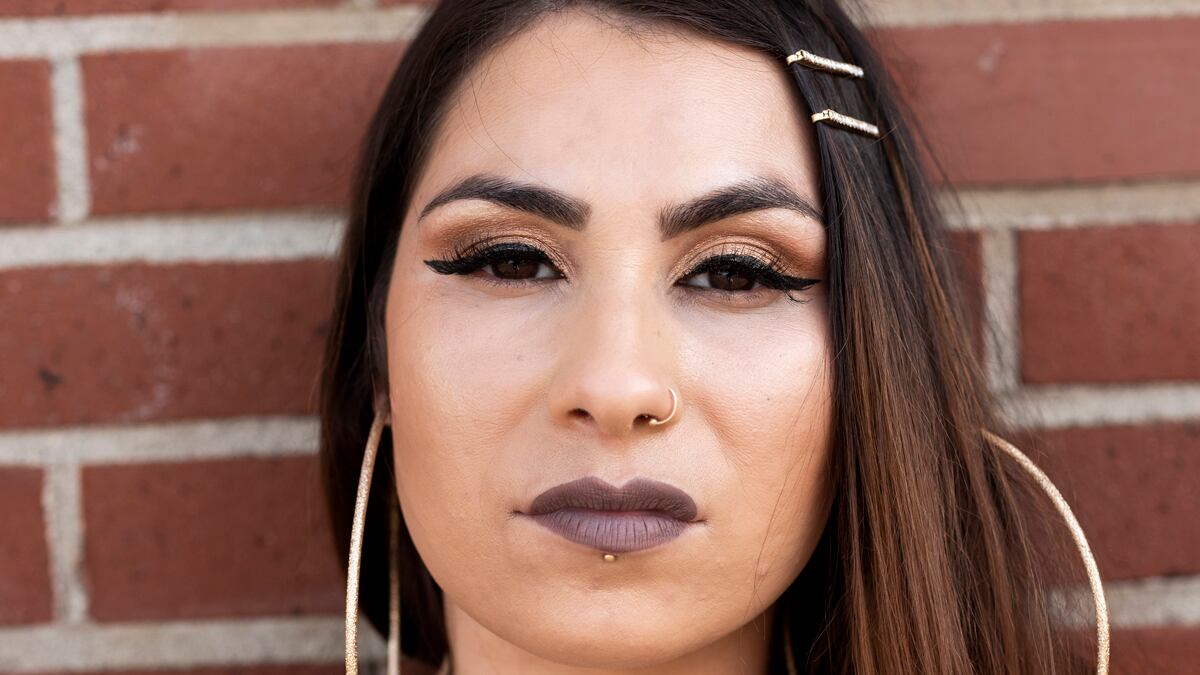2. Raquel Divar
SOUNDS LIKE: The hardest-slapping, pro-community support banger you've ever heard.
In the midst of an unprecedented pandemic and international uprising against racism and police brutality, Raquel Divar has never felt so optimistic.
"I'm fucking living for this shit. Let's fucking change the world," she says about the protests. "We're all in the streets, saying what we think. As much as everything is sad surrounding the reason we're doing it, I think it's positive momentum towards the right direction."
Like many up-and-coming Portland musicians, Divar had big plans for her career in 2020 before the pandemic hit. The Portland rapper—who unleashes brazen bars over smouldering, bass-heavy beats—was angling to release her debut album this summer. She was going to open for CocoRosie on the avant-pop duo's national tour and play Shambala, the biggest electronic music festival in Canada, which has now been moved online.
"Those are the two biggest opportunities I've ever had musically in my life," says Divar.
But what she's been doing instead isn't exactly a disappointment. She's still working on her debut album, tentatively titled Flight Class, but the only crowds she's rapped in front of over the past few months have been at abolish ICE rallies.
"The ICE ones are the only ones I can rap at because I'm not Black, so I'm here representing for Brown pride," she says. "I think everyone is going to be protesting all summer. I want to be there, I want to focus my energy towards that."
Divar came up in the Bay Area club scene, where she'd often rap over bombastic dubstep beats. When she moved to Portland seven years ago, she was worried her sound was too electronic for the hip-hop crowd, and too hip-hop for the electronic crowd.
"I would have to win them over with either the beats or the raps," she says of her early career. "If I was in a hip-hop setting, I would have to play the right songs in the right order to get them to understand the beats."
That's changed in recent years, thanks in part to the rise of a long list of women rappers who favor futuristic beats, from the hard-hitting club of Rico Nasty and Leikeli47 to the warped trap of City Girls and Saweetie. Divar credits Cardi B's Invasion of Privacy, in particular, for mainstreaming electronic-influenced hip-hop production.
"I feel like people just see a badass female rapping and are like, 'Cool, this is dope,'" she says. "As opposed to being like, 'I don't know about these weird beats.'"
But credit is also due to how Divar has honed her craft and sharpened her sound. Over the course of two EPs and a slew of singles, her flow has become more heated and focused. Released in 2018, Divar's most recent EP, The Reign, is full of spacey, metallic club tracks and sharpshooting verses. But the four singles she's released in the past year are perhaps a better indication of where her sound is going. On songs like "Big Shit" and "Renegade," her delivery is both breakneck and elastic, and so dynamic it's a beat unto itself. With a whomping industrial beat supplied by Portland producers Jvnitor, her single "Cherry" is basically two minutes of straight bars.
Besides, Divar says she felt backed by the Portland hip-hop scene long before club and trap took over mainstream hip-hop. The months she spent working on the music video for "Cherry" were particularly affirming: What began as a storyboard Divar developed alone in her bedroom became one of her biggest, most collaborative projects yet.
After local producer Lydia Buesseler reached out to Divar, the project snowballed into a professional-scale shoot while remaining essentially DIY. Berlin-based director Ash O'Neil and Portland-via-Mexico cinematographer Adolfo Cantú-Villarreal signed on. The production enlisted a motorcyclist to ride around Divar in an empty parking lot, along with mask-clad dancers, a drone operator and a stylist to pull together the dozen-plus deep red outfits, which starkly contrast the gray backdrop of a middle school in deep Southeast Portland.
"It was just really dope to see what we can do ourselves as a grassroots community," says Divar. "I understand I'm the focal point of this song or whatever, but it was really a community project where we all came together and put our talents out there so everybody could see it."
In that sense, spending the summer protesting—and taking part in a movement that aims, in part, to replace punitive justice with systems of mutual aid—isn't exactly a diversion from her work as a musician, even if it means putting the release of Flight Class on hold until fall.
The first protest where Divar rapped was a march and rally organized by the People Versus ICE PDX held at the end of June. Divar marched at the front, and when the crowd arrived at the U.S. Immigration Courthouse downtown, she was the first to take the stage, where she led chants and spit 16-bars. The verse was written specifically for the protest, and included the lines: "We don't want no bloodshed, we just wanna function/But if you pushin', we gon' push back."
Before she performed, Divar asked the crowd to raise their fists in solidarity.
"Coming back to the community aspect of the music video and the protests," she says, "each of us as an individual is powerful and all of us together are powerful as a community and as a movement. I think it's really important right now for everybody to recognize the power of their voice, the power of their actions, and the power we all have together."
Best New Bands 2020
1. Maita | 2. Raquel Divar | 3. Methods Body | 4. Soft Kill | 5. Bryson Cone | 6. Sea Moss | 7. Marcus McCauley | 8/9/10. Spoon Benders | 8/9/10. Mope Grooves | 8/9/10. Mo Troper
Four Portland Music Community Leaders Speak on the Scene's Role During the Protests
